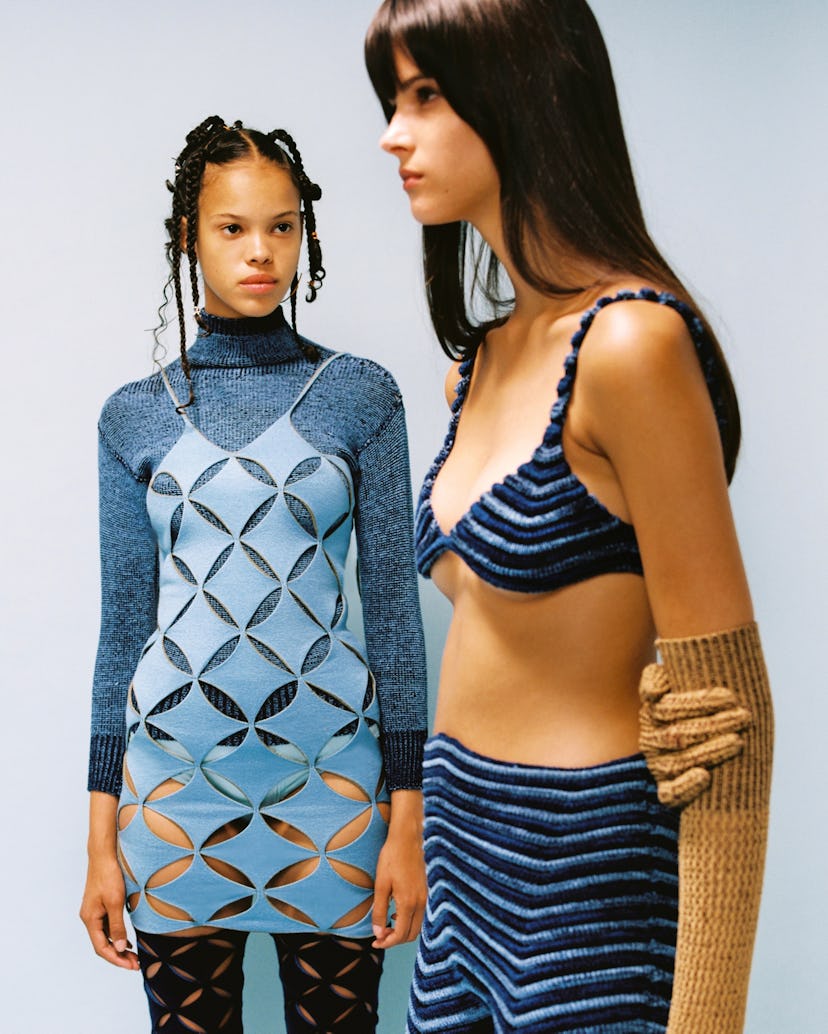Isa Boulder Wants to Revive the Craft of Cool Knitwear

The fashion brand Isa Boulder has redefined the idea of the “awkwardly sexy” aesthetic (think: high-cut, silky, clingy bikinis and thin, futuristic-looking knitwear straight from your favorite ‘90s music video). Designers Cecilia Basari and Yuli Suri launched Isa Boulder three years ago as a Bali-based bespoke swimwear label, after being inspired by local Balinese craftspeople who specialized in making bathing suits. They have since become known in the emerging designer space—their pieces are sold on MatchesFashion, Net-a-porter, and SSENSE and have been worn by the likes of Megan Thee Stallion.
While Basari and Suri still make swimwear made-to-order, the label’s knits have grown to be just as strong—shrug argyle sweaters with revealing cut-outs, knitted bra tops, backless sweaters, bodycon dresses, and even matching waffle knit pants and knitted halter tops are now standard Isa Boulder fare. But the brand’s pieces also straddle the line between commercial and extreme. Take, for example, large open-weave crochet dresses that are made entirely by hand and are more akin to a piece of couture than your grandma’s favorite sweater, or tented flared pants that stand out when compared to typical straight and narrow knitted trousers.
“We try to play with these stereotypes of sexy garments and make them more tactile and somehow sexy,” Basari tells W. “But the starting point for most of our collections would be the craft of it. I’ve been obsessed with our yarn for maybe two years now. I love knitwear because of the different kinds of knitting techniques, even crochet, and all the different ways you can explore the material.”
The Isa Boulder designers source inspiration from unconventional places—they look to fashion industry insiders as style icons rather than celebrities or pop stars. Basari’s personal favorite is former Celine creative director Phoebe Philo, she says. “I love her personal style and how she wears whatever is comfortable for her, but also she has a great eye. I love women who stick to their true selves—they don't follow trends, they value personal comfort and whatever they wear, they really elevate it.”
The label’s latest winter 2021 collection takes the very same approach. “We wanted it to be tactile and form-fitting to the female form,” Basari says. “From the beginning, we were researching what is typically overtly sexy and how does that work with knits?” The result: classic crochet and argyle techniques mixed with ribbed knits in contrast colors and a new three-dimensional, soft, sponge-y knit done in both monochrome and trios of colors.
The designer duo and their team of artisans begin work on a collection by draping the fabrics across mannequins to form new shapes that feel organic rather than forced from a sketch. “Each season, there’s still a lot to discover with the yarn itself,” says Basari. “It’s nice to work from that starting point and see new silhouettes and how we can develop the collection from that.”
Since every crochet piece the brand creates is entirely handmade in Bali, Basari feels she is able to support her local community, and in turn, its local ecosystem. Sustainability is key for the brand, and Isa Boulder is trying to make an impact by using a production method with less waste.
“We don’t stock up on yarns, we don’t have to order from overseas,” she explains. “Yarn is actually kind of the bone, the flesh, the neck, the everything of the garment. There isn’t any embellishment to it. If you’re talking about a dress, there will be hardware or thread and notions, but with knitwear, the yarn is everything.”
Up next? Isa Boulder is focusing on expanding their knitwear line with new silhouettes and brand new textures. Although swimwear will forever be a favorite for the Instagram crowd and through custom orders, Basari admits there’s something really special about knits that the duo can’t escape. “It’s a very calming process to knit and get to that end point,” she says. “It teaches you a lot of patience. There’s something very soothing about it.”
This article was originally published on